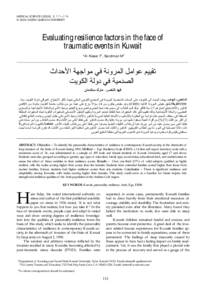Document
Evaluating resilience factors in the face of traumatic events in Kuwait.
Contributors
Sandman, Mark., Author
Other titles
تقييم عوامل المرونة في مواجهة الأحداث الصدمية في دولة الكويت
Publisher
College of Medicine, Sultan Qaboos University.
Gregorian
2000
Language
English
Subject
English abstract
Objective – To identify the personality characteristics of resilience in contemporary Kuwaiti society, in the aftermath of Iraqi invasion of the State of Kuwait during 1990. Method – Ego Resiliency Scale (ER89), a 14-item self-report inventory scale with a maximum score of 56, was administered to a sample of 495 male and female students of Kuwait University, aged 17 and above. Students were also grouped according to gender, age, type of education, family type, social status, educational bent, and marital status to assess the effect of these variables in their resilience scores. Results – Over one-third (37%) of valid subjects qualified as highly resilient, with the males scoring higher than scores than the females. Students from extended families scored higher than those from nuclear families. Science students had higher resilience scores than arts students. Conclusion – There is significant resilience and adaptability among Kuwaitis, with males scoring higher than females. This study could serve as a baseline for future inquiry into strength and resilience qualities of the Arab population in the Arabian Gulf region
Sponsorship
SQU
Member of
Resource URL
Citation
Al-Naser, Fahad, & Sandman, Mark (2000). Evaluating resilience factors in the face of traumatic events in Kuwait. Sultan Qaboos University Medical Journal, 2 (2), 111–116.
Arabic abstract
الهدف - تحديد الخصائص الشخصية للمرونة في المجتمع الكويتي المعاصر ، في أعقاب الغزو العراقي لدولة الكويت خلال عام 1990. الطريقة - مقياس مرونة الأنا (ER89) ، مقياس جرد تقرير ذاتي مكون من 14 عنصرًا بحد أقصى للدرجات 56 ، على عينة من 495 طالب وطالبة من جامعة الكويت ، الذين تتراوح أعمارهم بين 17 وما فوق. تم تصنيف الطلاب أيضًا وفقًا للجنس والعمر ونوع التعليم ونوع الأسرة والحالة الاجتماعية والميل التعليمي والحالة الاجتماعية لتقييم تأثير هذه المتغيرات في درجات المرونة الخاصة بهم. النتائج - أكثر من ثلث (37٪) من الأشخاص الصالحين مؤهلين على أنهم يتمتعون بدرجة عالية من المرونة ، مع تسجيل الذكور أعلى من درجات الإناث. سجل الطلاب من العائلات الممتدة درجات أعلى من تلك الموجودة في الأسر النووية. حصل طلاب العلوم على درجات أعلى من المرونة مقارنة بطلاب الفنون. الخلاصة - هناك مرونة كبيرة وقدرة على التكيف بين الكويتيين ، حيث سجل الذكور أعلى من الإناث. يمكن أن تكون هذه الدراسة بمثابة خط أساس للتحقيق المستقبلي في خصائص القوة والمرونة لدى السكان العرب في منطقة الخليج العربي.
Category
Journal articles

